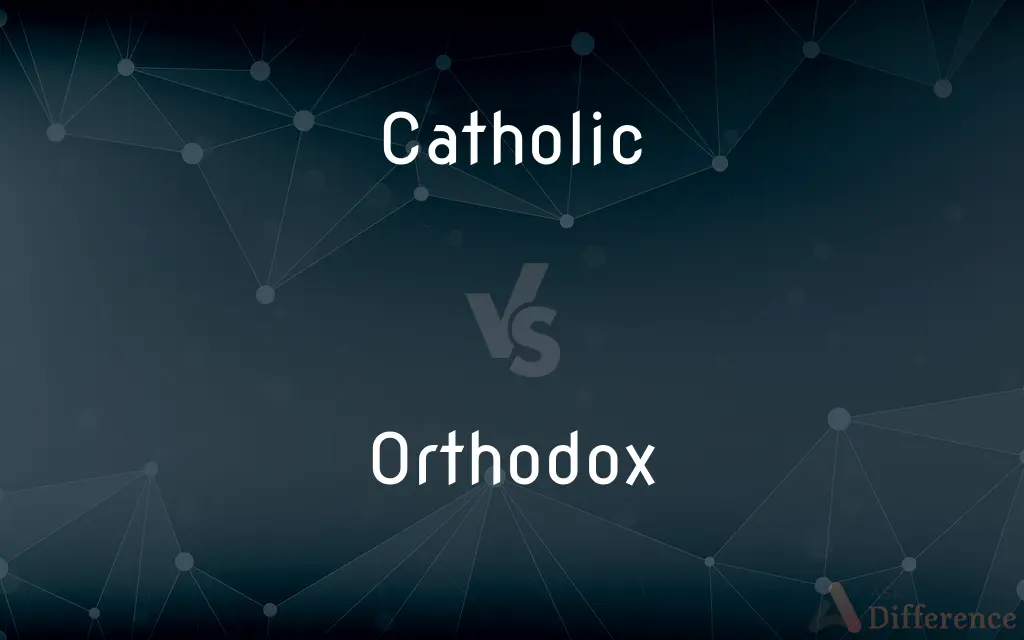Catholic vs. Orthodox — What's the Difference?
By Tayyaba Rehman — Published on September 1, 2023
"Catholic" refers to the universal Christian church or specifically the Roman Catholic Church, while "Orthodox" pertains to the Eastern Orthodox Church, maintaining traditions from early Christianity.

Difference Between Catholic and Orthodox
Table of Contents
ADVERTISEMENT
Key Differences
Both "Catholic" and "Orthodox" designate significant branches of Christianity. The Catholic Church, with the Pope at its helm in Vatican City, is a continuation of the early universal Christian Church. The Orthodox Church, meanwhile, represents Christianity's eastern traditions, having its roots in the Byzantine Empire.
The schism in 1054 A.D. separated the two. Catholics and Orthodox differ in practices, theology, and ecclesiastical governance. While Catholics recognize the Pope's primacy, the Orthodox Church functions more as a communion of independent local churches.
Liturgical practices differ between the two. Catholics celebrate Mass, while the Orthodox have the Divine Liturgy. Both rituals hold the Eucharist at their core, but their executions, liturgical calendars, and certain beliefs—like the Filioque controversy concerning the Holy Spirit—contrast.
The languages and cultures influencing each church's evolution also diverged. While Latin dominated Catholic proceedings, Greek played a foundational role for the Orthodox. However, as time progressed, the Orthodox Church incorporated various languages, respecting its diverse believers.
In essence, "Catholic" and "Orthodox" are terms designating two major Christian traditions. The former is rooted in the Latin-speaking western regions of the old Roman Empire, and the latter in the Greek-speaking east. Their theological, liturgical, and governance differences have persisted for centuries, even amidst mutual respect.
ADVERTISEMENT
Comparison Chart
Origins
Rooted in the universal Christian church, centered in Rome
Rooted in the eastern traditions of Christianity, Byzantine influences
Head
Pope
No singular head; bishops of independent local churches
Liturgy
Mass
Divine Liturgy
Primary Language
Traditionally Latin
Traditionally Greek
Major Split
Schism with the Orthodox in 1054 A.D.
Schism with the Catholics in 1054 A.D.
Compare with Definitions
Catholic
Relating to the universal Christian church.
The catholic faith is practiced globally.
Orthodox
Of or relating to or characteristic of the Eastern Orthodox Church
Catholic
Specifically pertaining to the Roman Catholic Church.
She attends a Catholic school downtown.
Orthodox
Adhering to traditional beliefs or customs.
Her orthodox views are based on ancient teachings.
Catholic
Universal or comprehensive.
His catholic tastes in music include everything from jazz to punk.
Orthodox
Relating to the Eastern Orthodox Church.
The orthodox congregation celebrated Easter a week later.
Catholic
Including a wide variety of things; all-embracing.
Her reading habits are quite catholic.
Orthodox
Adhering to the accepted or traditional and established faith, especially in religion.
Catholic
Related to the teachings or traditions of the Roman Catholic Church.
He studied Catholic theology for years.
Orthodox
Adhering to the Christian faith as expressed in the early Christian ecumenical creeds.
Catholic
Of the Roman Catholic faith.
Orthodox
Of or relating to any of the churches or rites of the Eastern Orthodox Church.
Catholic
(slang) Permissive of unprotected sex.
Orthodox
Of or relating to Orthodox Judaism.
Catholic
Of or pertaining to, or affecting the Roman Catholics; as, the Catholic emancipation act.
Orthodox
Conforming to the accepted, established, or traditional doctrines of a given faith, religion, or ideology.
Catholic
An adherent of the Roman Catholic church; a Roman Catholic.
Orthodox
Of or pertaining to the churches of the Eastern Christian rite, especially the Greek Orthodox or Russian Orthodox churches, which do not recognize the supremacy of the Pope of Rome in matters of faith.
Catholic
A member of the Roman Catholic Church.
Orthodox
Conforming strictly to established doctrine.
His approach to the subject is quite orthodox.
Catholic
Of broad or liberal scope; comprehensive
"The 100-odd pages of formulas and constants are surely the most catholic to be found" (Scientific American).
Orthodox
Adhering to what is commonly accepted, customary, or traditional
An orthodox view of world affairs.
Catholic
Including or concerning all humankind; universal
"what was of catholic rather than national interest" (J.A. Froude).
Orthodox
One that is orthodox.
Catholic
Of or involving the Roman Catholic Church.
Orthodox
Orthodox A member of an Eastern Orthodox church.
Catholic
Of or relating to the universal Christian church.
Orthodox
Adhering to whatever is customary, traditional, or generally accepted.
Catholic
Of or relating to the ancient undivided Christian church.
Orthodox
Of the eastern churches, Eastern Orthodox.
Catholic
Of or relating to those churches that have claimed to be representatives of the ancient undivided church.
Orthodox
Sound in opinion or doctrine, especially in religious doctrine; hence, holding the Christian faith; believing the doctrines taught in the Scriptures; - opposed to heretical and heterodox; as, an orthodox Christian.
Catholic
A member of a Catholic church, especially a Roman Catholic.
Orthodox
According or congruous with the doctrines of Scripture, the creed of a church, the decree of a council, or the like; as, an orthodox opinion, book, etc.
Catholic
Universal; all-encompassing.
Orthodox
Adhering to what is commonly accepted;
An orthodox view of the world
Catholic
Alternative case form of Catholic.
Orthodox
Holding conventional or traditional beliefs.
His orthodox stance sometimes clashes with modern views.
Catholic
(obsolete) Common or prevalent; especially universally prevalent.
Orthodox
Of a branch of Judaism.
Catholic
Embracing all.
Orthodox
(botany) Of pollen, seed, or spores: viable for a long time; viable when dried to low moisture content.
Catholic
Universally applicable.
Orthodox
Adhering to generally approved doctrine or practices; conventional. Opposed to unorthodox.
He saluted me on both cheeks in the orthodox manner.
Catholic
Of universal human interest or use.
Orthodox
Of or pertaining to or characteristic of Judaism;
Orthodox Judaism
Catholic
Universal or general; as, the catholic faith.
Men of other countries [came] to bear their part in so great and catholic a war.
Orthodox
Generally accepted or approved.
It's an orthodox belief that the sun rises in the east.
Catholic
Not narrow-minded, partial, or bigoted; liberal; as, catholic tastes.
Catholic
A person who accepts the creeds which are received in common by all parts of the orthodox Christian church.
Catholic
Of or relating to or supporting Catholicism;
The Catholic Church
Catholic
Free from provincial prejudices or attachments;
Catholic in one's tastes
Catholic
A member of a Catholic church
Common Curiosities
Does "orthodox" always refer to religion?
No, "orthodox" can mean adhering to established or traditional beliefs in any context.
Why might someone use "catholic" in a lowercase form?
When "catholic" is lowercase, it often means "universal" or "comprehensive."
Do Catholics and Orthodox Christians read the same Bible?
Both use the Old and New Testaments, but the Orthodox Bible includes additional texts.
What language is commonly linked with the Orthodox Church?
Greek, though the Orthodox Church has services in many languages due to its diverse followers.
What's the primary distinction between Catholic and Orthodox churches?
Catholics align with the Pope in Rome, while the Orthodox Church has multiple self-governing bodies without a central figurehead.
How do liturgical practices vary between Catholic and Orthodox churches?
While both celebrate the Eucharist, Catholics have the Mass, and Orthodox Christians have the Divine Liturgy.
Was there a specific event that separated Catholics and Orthodox Christians?
Yes, the Great Schism in 1054 A.D. formally divided the two.
Can both Catholics and Orthodox Christians take communion in each other's churches?
Generally, they can't due to theological differences, but exceptions exist.
Which language is traditionally associated with the Catholic Church?
Latin.
What's a defining characteristic of the Orthodox Church's structure?
It operates as a communion of independent local churches.
Share Your Discovery

Previous Comparison
Review vs. Evaluate
Next Comparison
Dadling vs. DaddlingAuthor Spotlight
Written by
Tayyaba RehmanTayyaba Rehman is a distinguished writer, currently serving as a primary contributor to askdifference.com. As a researcher in semantics and etymology, Tayyaba's passion for the complexity of languages and their distinctions has found a perfect home on the platform. Tayyaba delves into the intricacies of language, distinguishing between commonly confused words and phrases, thereby providing clarity for readers worldwide.















































